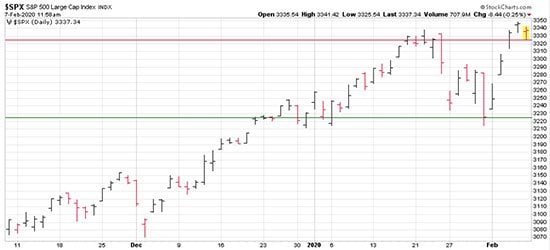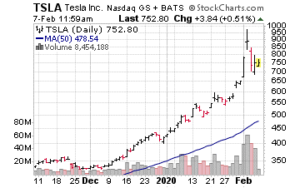The fast-moving rally that swept stocks higher last week took the S&P 500 and the other benchmarks right back to their respective highs.
Well, all the indexes except one important one: the Russell 2000 Index.

The Russell 2000 fell about 3% short of reclaiming its highs last week. That shows some implications about the real risk appetite of investors as the market rebounds from the coronavirus sell-off of two weeks ago.
One of my Ten Commandments of Trading is "Stocks are driven higher by speculation, not fundamentals."
Historically, the small-cap index is a great barometer for this. It's perfect for determining whether a rally is driven by an increase in risk appetite (speculation), or rebound buying as the crowd reacts to a trading situation or event.
Last week's rally was not led by the small caps. It was led by the large-cap tech stock names that have become almost "safety trades" due to their popularity.
 Of course, we also saw the Nasdaq driven to new highs on one "mania trade" as Tesla Inc. (NASDAQ: TSLA) shares took another shot to the moon. Believe me, this trade was nothing close to speculative. It was driven by short covering and the type of mania-driven sentiment that often marks a tradable top in a stock or the market. For my money, the smart traders are taking profits here and waiting to buy the stock at $600.
Of course, we also saw the Nasdaq driven to new highs on one "mania trade" as Tesla Inc. (NASDAQ: TSLA) shares took another shot to the moon. Believe me, this trade was nothing close to speculative. It was driven by short covering and the type of mania-driven sentiment that often marks a tradable top in a stock or the market. For my money, the smart traders are taking profits here and waiting to buy the stock at $600.
Getting back to my point, this all means the market is not likely to surge back into new high territory. Instead, I expect a fall into a trading range environment.
So far, the indication is that February will continue seeing a range-driven market. Of course, we can make a lot of money in a range!
This Week's Earnings Reports and the Coronavirus Headlines
Believe it or not, we're still going to have a steady flow of earnings reports this week. Last week's results maintained the positive trend that we've seen through the quarter. However, the reaction to results has started to become more muted.
By that I mean the earnings reactions have not been as dramatic after positive results.
This is due to investors becoming more cautious about jumping into a stock (or the market) after the routing we saw stocks take a few weeks ago. This is the same phenomenon causing small-cap stocks to see less buying interest. All in all, these two trends tell us it's time to up our defensive game because the next month or so may test the will of bullish traders.
Headline risks surrounding the novel coronavirus felt like they became benign last week. That was partly due to Chinese markets reopening. And the first thing their central bank did was announce massive rounds of liquidity injections into their financial systems.
One thing markets love is the high of quantitative easing. That feeling that the central bank won't let the market fail is a strong aphrodisiac that gets investors in the buying mood.
In the case of the coronavirus, we may be looking at a "tip of the iceberg" situation. That means the headline risk is likely to become increasingly strong.
My Bottom Line This Week and How to Trade the News
[mmpazkzone name="in-story" network="9794" site="307044" id="137008" type="4"]
This is not a market that requires you to sell everything and wait for a huge correction before you can buy. No, this is a market that will take measured steps lower. That means patience and buying the right stocks will get you through the next six weeks or so.
 If I had to buy and hold one ETF for the next six weeks, it would be the Consumer Staples ETF (XLP).
If I had to buy and hold one ETF for the next six weeks, it would be the Consumer Staples ETF (XLP).
Companies like Procter & Gamble and Clorox - while not sexy - are putting up the numbers that have been impressive, and they've got a nice kicker.
That kicker is the 2.6% dividend yield it's paying. That yield beats the still-dropping 10-year Treasury yield by more than a full percentage point. In addition, the volatility of the XLP is 60% less of that which we've seen in the broader markets.
While it's not a total "safe harbor" ETF, the Consumer Staples ETF isn't going to sink your portfolio as the volatility parade continues.
You Can Collect Four Separate Paydays in Under a Minute with This Options Trading Secret
Live on camera, America's No. 1 Pattern Trader is showing you the secret behind some of his biggest trades to date.
Watch as he uses this special tool to collect four separate paydays in under a minute - all from enormous companies like Netflix, Apple, Facebook, even Amazon.
While it may have taken Tom years to invent this moneymaking "machine," it's super easy to understand and utilize.
All it takes is a few simple mouse clicks, and you could be hundreds, even thousands, richer.
This is an opportunity you won't want to miss out on.
Click here to get started today.
Follow Money Morning on Facebook and Twitter.
About the Author
Chris Johnson (“CJ”), a seasoned equity and options analyst with nearly 30 years of experience, is celebrated for his quantitative expertise in quantifying investors’ sentiment to navigate Wall Street with a deeply rooted technical and contrarian trading style.



